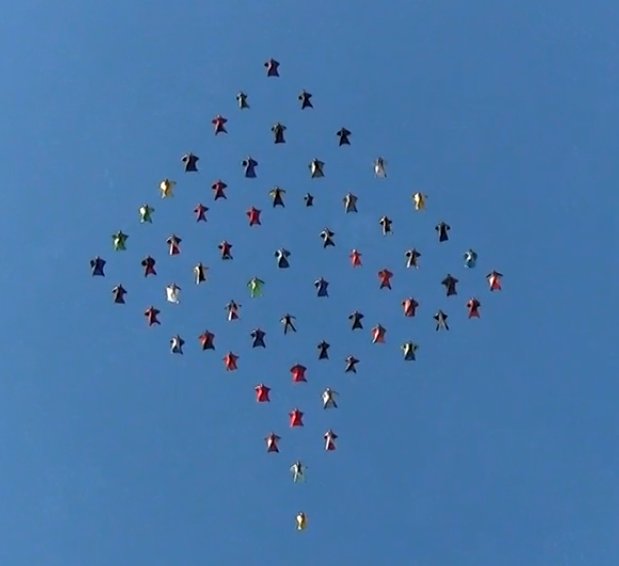Recommended Posts
billvon 3,151
This regulation was concerning SOx and NOx emissions. Neither is a significant greenhouse gas.
rushmc 23
Quote>Nope, I am not
This regulation was concerning SOx and NOx emissions. Neither is a significant greenhouse gas.
I am not taking about green house gasses
I am talking about the rule that is being delayed
if we falter and lose our freedoms,
it will be because we destroyed ourselves."
Abraham Lincoln
mnealtx 0
Quote>Then you admit that the 'dirtier air' point was bogus?
Nope. But keep trying!
Then you need to prove that keeping the status quo would result in dirtier air than the status quo....you can't have it both ways.
I love you, Shannon and Jim.
POPS 9708 , SCR 14706
SkyDekker 1,465
QuoteAnother out of thin air number
Just cause you post we are supposed to beleive it huh
http://junksciencecom.files.wordpress.com/2011/03/epa_s-clean-air-act-final.pdf
Start at page 8 regarding your death claims
Now do you want to talk about zero skydiving deaths?
How about auto deaths?
Wrong prescribed drug deaths?
Bad medicine deaths?
All to zero is obtainable
Is the cost worth it to you?
Really Steve Milloy? The guy who was a paid spokesperson for oil and tobacco now is a credible scientist?
wmw999 2,622
The status quo a couple hundred years ago was to just let the ocean carry out all the waste. There was plenty of ocean, after all. And you still can't see the Texas-sized trash heap from land, so that "status quo" still works.
In a complex system like world and society, it's stupid to talk about individual factors as though they existed in a vacuum. Even something as unitary as smallpox (i.e. very contagious and controllable with a vaccine) could have its impact affected by population density and social habits.
That's why simple answers to complex questions are nearly always wrong, and why there will never be a perfect solution to a complex problem. We (human societies) often do pretty well in a crisis. I'm thinking, though, that leaving things to get to crisis stage isn't always the best solution.
Wendy P.
mnealtx 0
QuoteThe problem with maintaining the status quo in one area (like air pollution regulation) is that the status quo isn't maintained in any other. People are still increasing the population, they're still congregating in cities, and they're still using more and more electricity (at least in some places).
The status quo a couple hundred years ago was to just let the ocean carry out all the waste. There was plenty of ocean, after all. And you still can't see the Texas-sized trash heap from land, so that "status quo" still works.
In a complex system like world and society, it's stupid to talk about individual factors as though they existed in a vacuum. Even something as unitary as smallpox (i.e. very contagious and controllable with a vaccine) could have its impact affected by population density and social habits.
That's why simple answers to complex questions are nearly always wrong, and why there will never be a perfect solution to a complex problem. We (human societies) often do pretty well in a crisis. I'm thinking, though, that leaving things to get to crisis stage isn't always the best solution.
Wendy P.
I understand your point and even agree with it in principle, but it's not really applicable to the EPA ruling being discussed. The ruling had too short of a timeline and the delay gives plants more of an opportunity to get into compliance vs. shutting down entirely.
I love you, Shannon and Jim.
POPS 9708 , SCR 14706
rushmc 23
And that is the what the EPA is doing
BTW
The company I work for has already (with a few exceptions) has already met the delayed requirements ( IE we have met the new regulations)
So if the rules are killed there is an effect where I work
if we falter and lose our freedoms,
it will be because we destroyed ourselves."
Abraham Lincoln
kallend 2,194
QuoteQuote>Then you admit that the 'dirtier air' point was bogus?
Nope. But keep trying!
Then you need to prove that keeping the status quo would result in dirtier air than the status quo....you can't have it both ways.
No, he doesn't. YOU need to explain why you can't understand plain English.
The only sure way to survive a canopy collision is not to have one.
mnealtx 0
QuoteQuoteQuote>Then you admit that the 'dirtier air' point was bogus?
Nope. But keep trying!
Then you need to prove that keeping the status quo would result in dirtier air than the status quo....you can't have it both ways.
No, he doesn't. YOU need to explain why you can't understand plain English.
Even lamer than your usual, perfesser...shouldn't you be working on your future crime telepathy machine?
The ruling had not gone into effect, therefore there is no 'dirtier' or 'cleaner' to compare. Bill tried a lame smear and got called on it.
I love you, Shannon and Jim.
POPS 9708 , SCR 14706
QuoteQuote>Zero is ideal.
is there a natural level that would align with a pre-industrial society?
maybe not- preindustrial had a lot more wood burning, which is a pretty bad source of pollution as well. The particulate matter can get trapped in certain weather patterns - in the bay area we have winter Spare the Air days where fires are prohibited.
Quote
But I will turn your question back around
When is the air clean enough?
What cost to reach that goal is acceptable to you?
That was in fact the question asked of you. It's rude to dodge and ask the same question back before answering.
The incremental and progressive nature of the pollution regs is an acceptance of the fact that it's difficult to achieve in one single motion.
QuoteQuotea ruling that delays implementation of rules that reduces added pollution is by simple deduction a ruling that results in dirtier air.
Feel free to explain how keeping the status quo will 'result in dirtier air' than... the status quo.
a = delay of regs, or status quo
b = implementing regs on schedule, reducing pollution output
a is dirtier than b.
Without making any judgement of the significance of the delay, it's rather simple logic.
mnealtx 0
QuoteQuoteQuotea ruling that delays implementation of rules that reduces added pollution is by simple deduction a ruling that results in dirtier air.
Feel free to explain how keeping the status quo will 'result in dirtier air' than... the status quo.
a = delay of regs, or status quo
b = implementing regs on schedule, reducing pollution output
a is dirtier than b.
Without making any judgement of the significance of the delay, it's rather simple logic.
No, it's chop-logic and used for nothing more than to smear an opponent.
I love you, Shannon and Jim.
POPS 9708 , SCR 14706
kallend 2,194
QuoteQuoteQuoteQuotea ruling that delays implementation of rules that reduces added pollution is by simple deduction a ruling that results in dirtier air.
Feel free to explain how keeping the status quo will 'result in dirtier air' than... the status quo.
a = delay of regs, or status quo
b = implementing regs on schedule, reducing pollution output
a is dirtier than b.
Without making any judgement of the significance of the delay, it's rather simple logic.
No, it's chop-logic and used for nothing more than to smear an opponent.
Not kelp's, or billvon's, or my fault if you
The only sure way to survive a canopy collision is not to have one.
mnealtx 0
QuoteQuoteQuoteQuoteQuotea ruling that delays implementation of rules that reduces added pollution is by simple deduction a ruling that results in dirtier air.
Feel free to explain how keeping the status quo will 'result in dirtier air' than... the status quo.
a = delay of regs, or status quo
b = implementing regs on schedule, reducing pollution output
a is dirtier than b.
Without making any judgement of the significance of the delay, it's rather simple logic.
No, it's chop-logic and used for nothing more than to smear an opponent.
Not kelp's, or billvon's, or my fault if youcan'twon'tunderstand Englishbuy the imaginary scenario.
Fixed that for you.
I love you, Shannon and Jim.
POPS 9708 , SCR 14706
kallend 2,194
QuoteQuoteQuoteQuoteQuoteQuotea ruling that delays implementation of rules that reduces added pollution is by simple deduction a ruling that results in dirtier air.
Feel free to explain how keeping the status quo will 'result in dirtier air' than... the status quo.
a = delay of regs, or status quo
b = implementing regs on schedule, reducing pollution output
a is dirtier than b.
Without making any judgement of the significance of the delay, it's rather simple logic.
No, it's chop-logic and used for nothing more than to smear an opponent.
Not kelp's, or billvon's, or my fault if youcan'twon'tunderstand Englishbuy the imaginary scenario.
Fixed that for you.
Give it up, Mike, you aren't fooling anyone at all.
The only sure way to survive a canopy collision is not to have one.
mnealtx 0
QuoteQuoteQuoteQuoteQuoteQuoteQuotea ruling that delays implementation of rules that reduces added pollution is by simple deduction a ruling that results in dirtier air.
Feel free to explain how keeping the status quo will 'result in dirtier air' than... the status quo.
a = delay of regs, or status quo
b = implementing regs on schedule, reducing pollution output
a is dirtier than b.
Without making any judgement of the significance of the delay, it's rather simple logic.
No, it's chop-logic and used for nothing more than to smear an opponent.
Not kelp's, or billvon's, or my fault if youcan'twon'tunderstand Englishbuy the imaginary scenario.
Fixed that for you.
Give it up, Mike, you aren't fooling anyone at all.
Neither are you....anything to attack an opponent is fair game, even it's a scenario involving regs that hadn't been implemented.
I love you, Shannon and Jim.
POPS 9708 , SCR 14706
kallend 2,194
QuoteQuoteQuoteQuoteQuoteQuoteQuoteQuotea ruling that delays implementation of rules that reduces added pollution is by simple deduction a ruling that results in dirtier air.
Feel free to explain how keeping the status quo will 'result in dirtier air' than... the status quo.
a = delay of regs, or status quo
b = implementing regs on schedule, reducing pollution output
a is dirtier than b.
Without making any judgement of the significance of the delay, it's rather simple logic.
No, it's chop-logic and used for nothing more than to smear an opponent.
Not kelp's, or billvon's, or my fault if youcan'twon'tunderstand Englishbuy the imaginary scenario.
Fixed that for you.
Give it up, Mike, you aren't fooling anyone at all.
Neither are you....anything to attack an opponent is fair game, even it's a scenario involving regs that hadn't been implemented.
I'm not attempting to fool anyone by deliberately misreading what they wrote despite their repeated corrections. That is your strategy, and it isn't fooling anyone.
The only sure way to survive a canopy collision is not to have one.
rushmc 23
But the twisting of my postion is???
if we falter and lose our freedoms,
it will be because we destroyed ourselves."
Abraham Lincoln
kallend 2,194
QuoteThat is your strategy, and it isn't fooling anyone.
But the twisting of my postion is???
You wrote what you wrote. Only your fault if it wasn't what you meant.
The only sure way to survive a canopy collision is not to have one.
rushmc 23
QuoteQuoteThat is your strategy, and it isn't fooling anyone.
But the twisting of my postion is???
You wrote what you wrote. Only your fault if it wasn't what you meant.
Ah, so the nuances of sarcasm and meaning is a concept you do not understand
I will remember that
Thanks
if we falter and lose our freedoms,
it will be because we destroyed ourselves."
Abraham Lincoln


.thumb.jpg.4bb795e2eaf21b8b300039a5e1ec7f92.jpg)




Nope. But keep trying!
Share this post
Link to post
Share on other sites